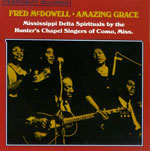Jesus is On the Main Line
| |

|
Some people think the blues are boring. Sometimes I think the blues are boring. Much like reggae there are complaints that it all sounds the same. This is probably more a symptom of "the blues; black music, played predominantly by whites". Not to take anything away from white people, some of my best friends are white people, but there is a tendency to be a little too respectful of the form, a little too academic. Missing the forest for the trees. The album Amazing Grace by Mississippi Fred McDowell is not boring, not in the least. It's incredibly alive and, befitting its name, amazing. It reverberates with the same holy ghost that gave birth to early rock n' roll: an in the moment spasm of higher consciousness, a break from rationality (and its limitations) that lent the best stuff so much of its holy rolling euphoria. The Rolling Stones wanted desperately to sound like Fred McDowell, among others. They ended up doing a damn fine job of it by the time of their cover of McDowell's ´You Got to Move' on Sticky Fingers. But the version featured here seems to get to the same exalted place with much less effort and is all the better for it. This is the original article, a collection of spirituals sung and played by Fred McDowell along with a group from Fred's church, The Hunter's Chapel Singers. The Hunter's Chapel Singers were four in number and included Fred's wife, Annie McDowell. The album was recorded in 1966 during a period of rediscovery of the still living blues pioneers that triggered a return to recording for many of these under recorded and neglected pioneers of the genre. Since the recording is relatively modern the sound quality is quite good which, though not essential to enjoyment, is still a nice bonus. Most importantly the performance is inspired; not sounding compromised by the late date of the recording and the age of the participants. Fred plays bottleneck guitar throughout including one short instrumental; ´Jesus Gonna Make Up My Dying Bed'. Guitar is in fact the only instrument featured here. The voices of Fred and the Hunger Chapel Singers easily fill the remaining space, singing in unison and solo, sometimes at the same time. The highlights are many including the aforementioned ´You Got To Move', the opening ´Jesus is on the Main Line', ´When I Lay My Burden Down' and ´Keep your Lamp Trimmed and Burning'. But it's all strong and recommended as a remedy to boredom from the blues. Another blues artist well worth checking for is Skip James. The inspired use of Skip's ´Devil Got My Woman' in the screen adaptation of Ghostworld has hopefully increased exposure to his music in the past two years. The Skip James Today! Album was another product of the renewed interest in blues pioneers spurred in part by the British blues boom of the early/mid 60's. And, like Fred McDowell's Amazing Grace record, this one still sounds vital and compelling today. Though purists prefer the early recordings from the 1930's, this record has its own sound and its own significant charm. For one, time had lent Mr. James's voice an even more strained and spooky quality than on earlier recordings. He sings in a downright eerie falsetto that can raise the hairs on the back of your neck. Peter Guralnick described it as "mellower, less harsh and more lyrical" than the older recordings. This recording is just Skip accompanying himself on guitar and on two tracks piano. Skip's piano playing is as idiosyncratic as his guitar playing. Never flashy, it rolls along with just the right, casual rhythmic feel and features mainly bouncing chords with the occasional short lilting run. Favorite tracks are the opener ´Hard Times Killing Floor', ´Crow Jane' and one of the piano numbers, a cover of Leroy Carr's ´How Long'. Skip James Today! and Fred McDowell's Amazing Grace are both great introductions to a much abused and consequently maligned musical form. As Willie Dixon once said "the ability to deliver these blues with depth of feeling can't be learned from books or schools". You don't have to listen long to hear the depth of feeling here. © 2003William Crain |